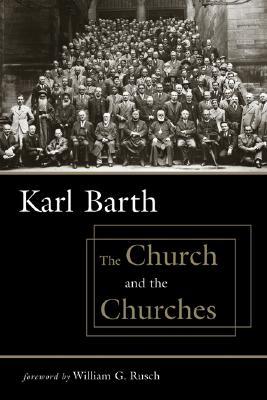- Bible
- Read the Bible
- Bible Versions
- Verse of the Day
- Reading Plans
- Verses by Topic
- Books of the Bible
- Bible Images
- Study
- Commentaries
- Concordances
- Dictionaries
- Encyclopedias
- Sermons
- Bible Atlas & Maps
- BP Wiki
- Devotionals
- Today's Devotionals
- Light of the World
- All Devotionals
- Inspirational Quotes
- More
- Picture Quotes
- Videos
- Inspirational
- Bible Study
- What The Bible Says
- Bible Q&As
- Daily Bread
- Bible by Genre
- Bible Stories
- Random Bible Verse
- Community
- Store
The Church and the Churches
by Karl Barth
Foreword by William G. Rusch
How can Christians claim to hold in common one Lord, one faith, and one baptism while their churches remain splintered? Theological giant Karl Barth's mature, historic discussion of the problem of church unity still deserves careful attention.
Originally written for the 1937 Edinburgh World Conference on Faith and Order, Barth's profound reflections continue to speak to today's multiplicity of churches. While some of his subject matter -- the predicament of churches in Germany before World War II, for instance -- may now be of mostly historical interest, his call for Christians to honestly listen to Christ through their various traditions is as fresh and demanding as ever.
Through this thoughtful inquiry Barth brings clarity to the relationship between the Church and the churches, calling believers everywhere to a more serious confession of Christ. Those actively engaged or interested in contemporary ecumenical ventures cannot afford to ignore the foundation for unity laid out in this little Barth volume.
How can Christians claim to hold in common one Lord, one faith, and one baptism while their churches remain splintered? Theological giant Karl Barth's mature, historic discussion of the problem of church unity still deserves careful attention.
Originally written for the 1937 Edinburgh World Conference on Faith and Order, Barth's profound reflections continue to speak to today's multiplicity of churches. While some of his subject matter -- the predicament of churches in Germany before World War II, for instance -- may now be of mostly historical interest, his call for Christians to honestly listen to Christ through their various traditions is as fresh and demanding as ever.
Through this thoughtful inquiry Barth brings clarity to the relationship between the Church and the churches, calling believers everywhere to a more serious confession of Christ. Those actively engaged or interested in contemporary ecumenical ventures cannot afford to ignore the foundation for unity laid out in this little Barth volume.
BUY NOW
Paperback, 71 pages
Published September 21st 2005 by Eerdmans (first published September 15th 2005)
© 2025 Bibleportal.com All rights reserved.

Karl Barth was a Swiss Reformed theologian whom critics hold to be among the most important Christian thinkers of the 20th century.
Beginning with his experience as a pastor, he rejected his training in the predominant liberal theology typical of 19th-century Protestantism. Instead he embarked on a new theological path initially called dialectical theology, due to its stress on the paradoxical nature of divine truth (e.g., God's relationship to humanity embodies both grace and judgment). Other critics have referred to Barth as the father of neo-orthodoxy -- a term emphatically rejected by Barth himself. The most accurate description of his work might be "a theology of the Word." Barth's theological thought emphasized the sovereignty of God, particularly through his innovative doctrine of election.
Barth tries to recover the Doctrine of the Trinity in theology from its putative loss in liberalism. His argument follows from the idea that God is the object of God's own self-knowledge, and revelation in the Bible means the self-unveiling to humanity of the God who cannot be discovered by humanity simply through its own efforts.
... Show more